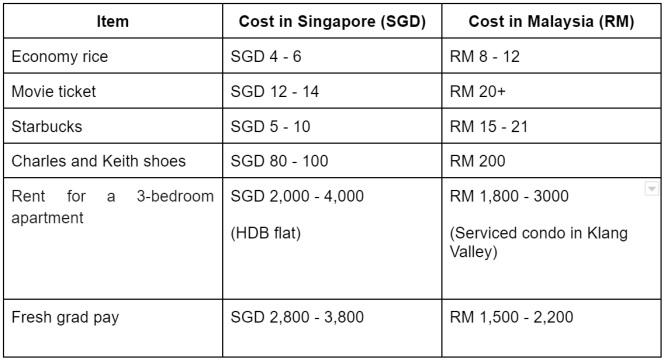I was born and raised in Malaysia, but back in 2013, I officially moved to Singapore from Malaysia in 2013 because I had to continue my Bachelor’s Degree here. After I graduated, I married someone local.
As someone who has lived here for 10 years, here is my take on the hot-button question — “Why should you move to Singapore?”
People say: “The cost of living is higher in Singapore than in Malaysia,” — but is it really?
Here’s a breakdown of the costs between Singapore and Malaysia.

Living in Singapore is more sustainable. This Malaysia reveals why she decided to move there permanently.
It comes as a surprise to me that the cost of living in Malaysia is higher.
This is especially if you consider dollars-to-dollars, ringgit-to-ringgit, without conversion.
Here’s one example:
In Singapore, if you earn 2,000 SGD and you want to spend SGD 200, you can get Coach or Braun Buffel. If you don’t convert SGD to RM, you can easily afford the international brands with your income.
But in Malaysia, if you earn RM2000, the Coach bag is RM600. You’d have to earn three times as much to afford the same lifestyle.
How much do you really need to earn to live comfortably in Singapore?
My husband and I earn a combined income of SGD 6,000+.
A few years ago, we bought a Housing and Development Board (HDB) apartment for SGD 430,000.
Since we bought the HDB in a younger area of Sengkang, and we were a young couple under the age of 30, we were qualified to receive a proximity and first-time buyer grant of SGD 90,000.
This was actually part of the Singaporean government’s initiative to help first-time home buyers. The amount you receive varies according to how many criterias you hit.
Because I am a PR (and my husband is a citizen), we were granted up to $90,000 to purchase our first home in Singapore. We only have to fork out $276 per month in cash for our half-loan (NOT full loan), while the rest is paid using our CPF accounts.
This was actually part of the Singaporean government’s initiative to help first-time home buyers, along with other criteria. The amount varies according to how many criteria you hit.
We considered ourselves extremely lucky. Not everyone is gonna get $90,000 for their first house.
You actually have money leftover for savings.
Our water and electricity is subsidised every three months now due to COVID-19 initiatives.
We don’t have a car, as we don’t need one. The public transportation system is more than capable of delivering us from Point A to Point B with minimal last-mile problems. There’s a mall every corner, and a station everywhere.
Food is affordable, as we get a CDC (Community Development Council) Voucher of SGD 150 for food at local eateries and SGD 150 at local supermarkets annually for these few years of COVID-19 recovery.
Expensive as the individual items are after conversion, when you consider the spending dollar-to-dollar, the income-to-spending ratio in Singapore is more sustainable.
To be honest, we have a lot of disposable income left over for savings and personal spending, like going out for meals, shopping, and vacations.
We save up to $500 each of our monthly income, with the remaining used for household funds and other monthly expenses.
To reiterate: Life in Singapore is definitely more comfortable, especially when you don’t convert the currencies. The standard of living is higher, and we enjoy a more secure and stable lifestyle.
7 reasons why I chose to live in Singapore as a Malaysian PR
Reason No. 1 – Salaries are generally higher in Singapore, and work conditions are mostly better. Although the job market in Singapore is more competitive than in Malaysia, there are also more opportunities.
Reason No. 2 – Singapore’s healthcare is more advanced.
Reason No. 3 – There are many Malaysians working in Singapore, so it’s easy to connect with fellow Malaysians.
Reason No. 4 – Higher standard of living.
Reason No. 5 – Better safety. I can take a bus or train or taxi anytime and anywhere. It’s totally safe to walk alone here at midnight as no one is going to rob me.
Reason No. 6 – Public transport is reliable.
Reason No. 7 – Good work-life balance.
That being said, the overtime culture in Singapore is a killer.
The most challenging aspects of adapting to life in Singapore is the fast pace of life and the crowded public transportation system.
Usually, I am able to leave on time, with a proper one-hour lunch break. But there are times during the peak season when I work overtime or on weekends to clear urgent tasks.
To counter this, Singaporean companies are trying to promote a better work-life balance by being more flexible and avoiding contacting staff on weekends.
In comparison, Malaysia is more chill, where the work culture is more laid-back, and people are more likely to socialise and bond with colleagues outside of work hours.
I do miss Malaysia, but I don’t regret my choice.
One thing I miss is my family in Malaysia. Unlike those across the causeway who can go back on weekends, my hometown is further away. The journey alone will take me half a day by plane.
I also miss the lepak lifestyle! I miss sitting at a mamak doing absolutely nothing with friends, no need for any plans or to decide where to go.
Over here it feels like we must always plan ahead. It’s hard to find a common free day here. Having said that, I have made my choice and decided that the pros outweigh the cons in moving to Singapore.
In summary, moving to Singapore has brought a lot of advantages. The higher income, better job opportunities, and improved quality of life make it worth the move.
As much as I miss Malaysia, we are happy with our decision and appreciate the life we have built here in Singapore.
– Humans of Kuala Lumpur
Story was first published on In Real Life
Story by Mushamir Mustafa
Edited by Gabriel Gan


